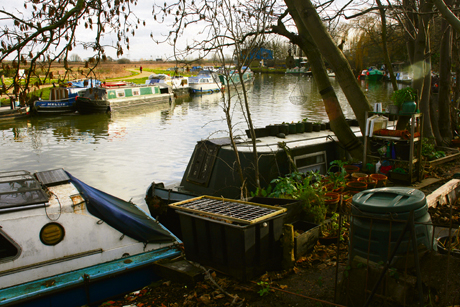Waterways charity calls for solutions to River Lea pollution

January on the River Lea. Photograph: Hackney Citizen
Back in December 2011 the Hackney Citizen reported on pollution in the River Lea.
We met with Theo Thomas, a canal keeper who is based in Bow Creek. Mr Thomas works for Thames 21, which is London’s leading waterways charity.
With the support of University College London, Thames 21 has been monitoring the pollution levels in the Lea since November 2010.
They say the biggest single polluter of the Lea is overflow from Deephams Sewage Treatment Works, based near Pickett’s Lock in Edmonton, which serves a population of some 850,000.
On top of this about 10 per cent of homes in London are ‘misconnected’. This means that waste water from showers, toilets and washing machines is going down the drainpipe instead of out into the sewers. Drainpipes are only meant for rain, and many of them lead to local rivers.
Another source of pollution is what is known as ‘road run-off’. It is estimated that there are more than 2.5 million private cars in London. Added to that are the buses, lorries, taxis, vans and the cars of people who commute into London.
Research on private cars indicates that approximately 16 per cent leak oil. In London it is calculated that 291,635 gallons of oil drip onto the roads. When it rains this gets washed into our rivers along with other chemicals that have been dumped plus grit and dirt. A number of these pollutants are poisonous and cancer causing.
The Lea flows through several London boroughs north of the River Thames. So Thames 21 is calling on the Mayor, Boris Johnson, as well as Drain London, the appointed body for sustainable drainage, and all the local authorities involved, to act and implement three solutions that they say will make the greatest difference to the water quality in the Lea.
The waterways charity is asking for a plan of action for the River Lea catchment area, which would include the introduction of a network of green drainage systems across north east London to extend the life of the Deephams Sewage Treatment Works, as well as the setting up of building control departments in local authorities with approved inspectors to regulate and prevent waste water from homes polluting local rivers.
It also wants to see a reduction in ‘road run-off’, when rivers are poisoned with chemicals and dirt every time it rains, by building rain gardens in unused car parking spaces and on roadside verges.
Theo Thomas, who now runs Thames 21’s Love the Lea campaign, said: “If London can begin to introduce these progressive solutions, it would change the way we treat our rivers and pollute our water. Every rain garden, wetland and green channel we can create will make our rivers a little healthier and we will make east London a greener, bluer and better place to live.”
